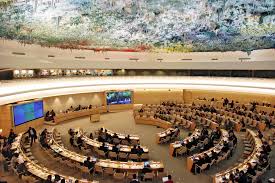The United Nations Human Rights Council (UNHRC) was established by the General Assembly in 2006. UNHRC replaced the Human Rights Commission after much criticism for allowing states to be members who had significant human rights abuses. UNHRC consists of 47 member states that are responsible for supporting and protecting human rights around the world. UNHRC is a subsidiary of the General Assembly and the General Assembly elects the members of UNHRC. The membership seats are divided between regional groups where 13 seats go to Africa, 13 to Asia, 6 to Eastern Europe, 8 to Latin America and the Caribbean, 7 to Western Europe and Others Group.
UNHRC deals with topics that revolve around human rights violations. UNHRC abides by the many different human rights conventions. UNHRC employs special rapporteurs and working groups to keep states in check. These special rapporteurs and working groups investigate and intervene in individual cases and emergency human rights cases. These special rapporteurs create reports that are then published for the global community to view.
Past/Current UNHRC Topics:
Berkeley Model United Nations (BMUN): Gender Equity in Education; Electoral Violence in Africa
Global Classrooms International Model United Nations (GCIMUN): Internet Freedom of Speech
Harvard Model United Nations (HMUN): Instances of Institutionalized Racism in Design and Practice; Public Defense Systems in Developing and Developed Countries
The Hague International Model United Nations (THIMUN): Measures to ensure respect for cultural diversity; Efforts to counter the sale of children, child prostitution and child pornography; The situation of human rights in Somalia; Implementation of the Convention on the Rights of persons with Disabilities 2006; Promoting access to adequate housing in the post 2015 development agenda; Measures to prevent the use of besiegement and starvation of civilians as a method of combat; The situation of human rights in the occupied Palestinian territories; Combating the growth of modern slavery
The Hague International Model United Nations Qatar (THIMUN Qatar): Protecting the rights of Palestinians in host nations; Measures to improve access to education for persons of disabilities; Promoting the role of women and girls in Afghanistan; The legal status of Internal Displaced Persons; Reviewing the Human Rights situation in Iraq; Ensuring the protection of the rights of the child in areas of armed conflict; The rights of migrant workers and members of their families; The rights of indigenous populations
Common Themes and Objectives:
Obviously, the topics center around different human rights abuses and how these violations must be remedied. The following broad topical themes encompass a variety pf the topics listed above:
- Minority discrimination
- Human Rights during conflict
- Family and gender rights
When researching the topics above, please make sure to review different conventions that apply to the topic. When writing resolutions, delegates need to make sure they acknowledge national sovereignty. However, UNHRC does have the right to make investigations through the use of human rights experts and the special rapporteurs on human rights violations. Resolutions must be explicit and explain each facet of human rights the topic wishes to address. This will make resolutions inclusive and effective.
Where and what to Research:
General
- The Best Delegate website has a large and helpful resource for more general research links: http://bestdelegate.com/research/.
- If you go to the United Nations Bibliographic Information System (UNBISNET), you can find any session’s voting records to see how the country you are representing voted on past issues. This particularly helps when you are unable to find current information on your country’s position through news publications or their foreign ministry site.: http://unbisnet.un.org:8080/ipac20/ipac.jsp?profile=bib&menu=search#focus.
- The UNHRC contains many working groups where states can propose recommendations to other states on what human rights abuses must be addressed. These recommendation are a part of the Universal Periodic Review (UPR). When representing a certain country, the UPR shows recommendations your state has made and what recommendations other states have made for your country: http://www.ohchr.org/EN/HRBodies/UPR/Pages/Documentation.aspx
- UNHRC also documents the progress of how countries have implemented UPR recommendations in the past through national government implementation reports: http://www.ohchr.org/EN/HRBodies/UPR/Pages/UPRImplementation.aspx
- Amnesty International provides a full profile for each country concerning human rights violations and issues within the country: https://www.amnesty.org/en/countries/
Minority discrimination:
- Through the UN High Commissioner for Human Rights, there are independent experts on minority issues who write reports on country visits regarding minority rights: http://www2.ohchr.org/english/issues/minorities/expert/index.htm
- The Minority Rights Group International website contains vast resource from press releases to a ranking of most discriminatory countries: http://www.minorityrights.org/index.html
Human Rights during Conflict:
- Human Rights Watch has documentation and press releases about human rights violations and potential violations as a result of conflict: http://www.hrw.org/by-issue/news-filter/3458
- Under the Peace, Conflict, and Human Rights section of the Council on Foreign Relations, delegates can research different topics as displayed on the far left that deal with human rights and conflict and its effects: http://www.cfr.org/issue/peace-conflict-and-human-rights/ri9?groupby=3&id=9&filter=2015
Family and gender rights:
- UNHRC has many resources on Women and Gender Rights. On the following website, you can find a break-down of different human rights issues in regards to Women and Gender Rights by referring to the In this section You can find personal stories as well as statements and press releases that can further your research: http://www.ohchr.org/EN/Issues/Women/WRGS/Pages/WRGSIndex.aspx
- The United Nations Population Fund (UNPF) has many publications and resources for research on family and gender rights issues. Under the topics section of their website, you can find information on human rights and gender equality: http://www.unfpa.org/



